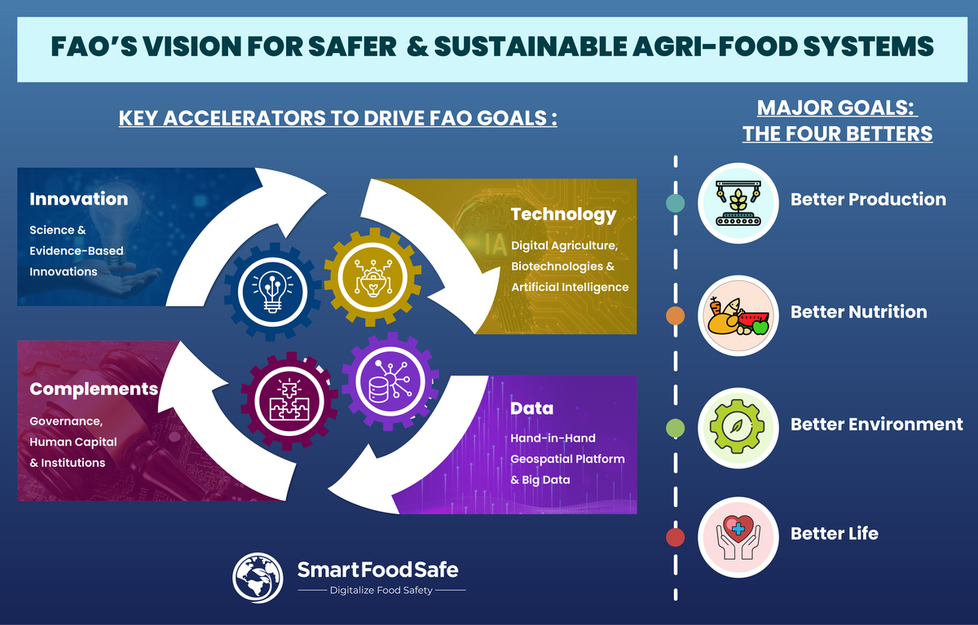
Did you know that an estimated 600 million people annually experience illness from consuming contaminated food, with children under five accounting for 40% of these foodborne diseases, resulting in 420,000 deaths yearly?
Safe food is of utmost importance, impacting every nation by significantly contributing to improved health, food security, livelihoods, economic development, trade, and the international reputation of each country. The Food and Agriculture Organization of the United Nations (FAO) plays a critical role in strengthening food safety systems worldwide to ensure safe and nutritious food for all by setting international standards, providing technical assistance, and advancing sustainable agriculture practices through capacity building, knowledge sharing, and crisis management.
Established in 1945, FAO is a specialized agency of the United Nations that focuses on addressing global food and agricultural bottlenecks and leads international efforts to bring strategic solutions and initiatives to prevent, detect, and respond to food safety issues. The primary goal of FAO is to attain global food security by achieving the United Nations’ Sustainable Development Goals, ascertaining that everyone has consistent access to safe, high-quality food. With 195 members, including 194 countries and the European Union, FAO works in over 130 countries across the world.
Through its International Food Safety Authorities Network (INFOSAN), FAO facilitates information exchange and collaboration among food safety authorities globally. Furthermore, FAO actively encourages adopting science-based food safety standards and practices. Therefore, the core notion of the FAO is rooted in its underlying “why” or purpose, which originated from the recognition of the pressing need to prioritize food safety worldwide as the significance of food safety transcends human health.
There is no one way to ensure that food safety is well-integrated into every stage of the food value chain, and hence a multitude of measures have to be undertaken to yield the best food safety outcomes. Recognizing this, FAO has taken the lead with the following food safety initiatives aimed at making a substantial difference.
Codex Alimentarius Commission
FAO, in collaboration with the World Health Organization (WHO), established the Codex Alimentarius Commission (CAC) to develop unified international food standards, principles, and texts such as codes of practice under the Joint FAO/WHO Food Standards Programme to safeguard food safety, preserve consumer health, and set up fair practices in food trade.
Competency Enhancement
FAO goes hand-in-hand with countries to strengthen their capacity to vitalize food safety systems. It provides technical assistance, training programs, and expertise to upgrade the knowledge and skills of government officials, food producers, and processors, assisting countries in implementing and enforcing effective food safety programs.
Risk Assessment and Management
FAO performs risk assessments, collaborating with governments, scientific institutions, and international partners to support countries in developing evidence-based food safety regulations and policies and establishing risk management schemes.
Foodborne Disease Surveillance
FAO actively encourages the establishment of robust systems for monitoring and tracking foodborne diseases. FAO’s foodborne disease surveillance efforts equip countries to detect food safety risks and carry out appropriate control measures with timely and precise oversight information.
Emergency Response and Preparedness
FAO supports countries in developing and implementing emergency response plans for foodborne outbreaks and safety incidents, conducting projects and missions worldwide, and monitoring through the Global Information and Early Warning System on Food and Agriculture. By promoting preparedness protocols and actions like risk communication, traceability, and CAPA systems, FAO minimizes the impact of food safety crises on public health and businesses.
Safe Production and Handling
FAO advocates for the adoption of Good Agricultural Practices (GAPs) and Good Manufacturing Practices (GMPs) to guarantee the safety of food production and handling. FAO also plays a critical role in establishing food safety management systems based on Hazard Analysis Critical Control Point (HACCP) for risk-based control of food safety hazards from farm to fork.
Food Safety Education and Awareness
FAO raises awareness about food safety issues among consumers, producers, and other stakeholders. It develops educational materials, campaigns, and training programs to promote safe food handling practices, hygiene, and nutrition. By empowering individuals with knowledge, FAO fosters a culture of food safety at all levels.
The FAO Strategic Framework 2022-31 aims to help achieve the goals of the 2030 Agenda by progressing agricultural and food systems in four important ways: efficiency, inclusiveness, resilience, and sustainability, with particular attention to creating better production, better nutrition, a better environment, and a better life for everyone, without leaving anyone behind.
A Closer Look at FAO’s “Four Betters”
Better Production: Focus on sustainable food production and consumption, fostering efficient and inclusive supply chains at local, regional, and global levels, and building resilient agri-food systems.
Better Nutrition: End world hunger, achieve food security, enhance nutrition for all through safe food, reduced loss/waste, transparent markets, expanded nutritious food, and increased accessibility of healthy diets, especially for vulnerable populations.
Better Environment: Protect, restore, and sustainably use land and marine ecosystems, prioritizing climate change mitigation and adaptation, sustainable biodiversity and ecosystem services, and development of urban food systems.
Better Life: Promote inclusive economic growth, reduce inequalities globally, empower rural women, drive inclusive rural transformation, address agriculture and food emergencies, build resilient agri-food systems, and enhance investment opportunities.
FAO disseminates four cross-cutting approaches that will be integrated into all programmatic interventions as key accelerators for propelling their four major goals, that is, the four betters:
Innovation – Science and Evidence-based Innovations
Technology – Digital Agriculture, Biotechnologies, and Artificial Agriculture
Data – Hand-in-Hand Geospatial Platform and Big Data
Complements – Governance, Human Capital, and Institutions
Smart Food Safe’s comprehensive suite of digital solutions delivers 18+ software modules designed to combine food supply chain functional expertise with innovation, technology, and data integrations to produce streamlined end-to-end applications.
As Frank Yiannas rightly stated, “Making Every Day a World Food Safety Day” is essential for thinking, talking, and practicing food safety every day. Transform your enterprise’s food safety paradigm with Smart Food Safe by mainstreaming food safety virtues into everything you do.
_1.png)